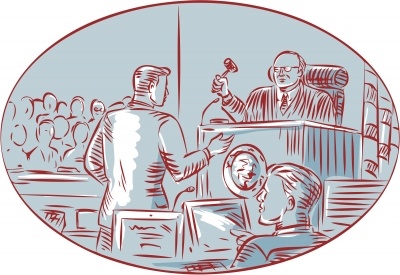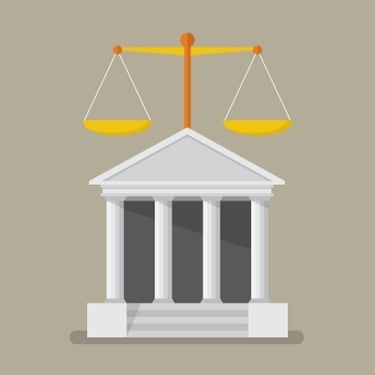 If you are in foreclosure in a judicial foreclosure state, your case can "go to trial."
If you are in foreclosure in a judicial foreclosure state, your case can "go to trial."
Some homeowners think they want to go to trial to have their day in court, a chance to tell their story to a judge or jury and get justice. However, real life is not like an episode of a legal drama show. There will be no sensational surprise at the end, and probably not much of anything exciting. And even if you do win, you will not get a free house.
In many cases, it makes sense to avoid going to trial because it's better to come to an agreement with the lender before it gets to that point. But sometimes that's not practical, and a case does end up at trial.
Judicial vs Nonjudicial Foreclosure Process
If you live in a nonjudicial foreclosure state, then the courts will not be involved in your foreclosure case and you will not have a trial unless you file your own lawsuit.
If you live in a judicial foreclosure state, then your lender has to initiate a civil lawsuit against you in order to foreclose, which will go through the courts, and that can result in a trial. It all starts when you are served a summons and complaint. You become the defendant in a lawsuit, and the party suing you is the plaintiff.
While being sued isn't fun, it's better than the alternative. In a judicial foreclosure states the burden of proof is on the plaintiff to prove that they have the right to foreclose. It takes more time on average to foreclose in judicial foreclosure states than in nonjudicial states. Homeowners have the right to answer the complaint, deny the plaintiff's allegations, and raise their own affirmative defenses.
Summary Judgment
In judicial foreclosure states like New York and New Jersey the plaintiff can move the court for a summary judgment to liquidate the affirmative defenses the defendant has raised. (In Florida the plaintiff will file a motion to strike the affirmative defenses.) The burden of proof is on the plaintiff to submit the proper case law showing why the defenses aren't meritorious and should not stand, and would not stand at a trial.
If they're successful in getting a judgment against all the defenses, there's no need for a trial and it will be canceled. In that case the plaintiff can file a motion for a final judgment, which if granted would allow them to set a sale date for the property.
A partial summary judgment is possible if the judge rules that some of the defendant's defenses can stand and some cannot. If the case goes to trial, only the defenses that the judge ruled can stand can be raised.
It can be tough for a plaintiff to meet the standard required to get a summary judgment, but it's easier for them to argue against the relatively-narrow affirmative defenses the defendant raised than to go to trial, which has a higher burden of proof since the whole case is at issue. They'd rather avoid going to trial if they can, but if there's no other way, a trial it will be.
Going To Foreclosure Trial
 As a civil matter, a foreclosure trial doesn't carry the possibility of sending anyone to jail, but it is still a proper trial that takes place in court with a court reporter documenting the proceedings and both sides giving sworn testimony under oath. Most likely a judge, not a jury, will decide the outcome of a foreclosure trial.
As a civil matter, a foreclosure trial doesn't carry the possibility of sending anyone to jail, but it is still a proper trial that takes place in court with a court reporter documenting the proceedings and both sides giving sworn testimony under oath. Most likely a judge, not a jury, will decide the outcome of a foreclosure trial.
The homeowner/defendant isn't required to have an attorney present at the trial, but should. What you don't know about the law will hurt you. As Abraham Lincoln said, “He who represents himself has a fool as a client.”
Discovery and Pre-Trial
Before the trial, there could be discovery, which is the process of obtaining information from the other party in the lawsuit. For example, if the bank is making allegations about a mortgage assignment, the homeowner or their attorney can request that the plaintiff produce the original documents, and the bank has to do it.
Most trial orders have specific pre-trial parameters. In New Jersey the judge will meet with the bank's attorney in a pre-trial conference to discuss exhibits, witnesses, and discovery. In Florida discovery has to be terminated 20-30 days prior to the trial. If it's not done before that, the ability to request discovery is waived.
At trial the plaintiff has to bring a representative with personal knowledge of the case as a witness to make certain allegations of fact, as well as submit affidavits regarding the case. Each side has the ability to cross-examine the other.
Ruling On The Case: Win, Lose, or Continue
The judge will consider all the evidence brought by the two sides and make a ruling. If the homeowner loses, the judge can grant final judgment of foreclosure and set a sale date anywhere from 30-120 days from the ruling.
The judge can also continue the trial for 90 days or more to give the parties the opportunity to resolve the matter with loss mitigation.
If the homeowner wins and the case is dismissed, they do NOT get a free house. The bank could amend their complaint and refile the same case again, or bring a new one if it's dismissed with prejudice. Being dismissed with prejudice is a big loss for the bank, and they may take a voluntary dismissal at trial to avoid it and come back with the proper documents.
The case could be dismissed because the plaintiff is determined to not be the right party in interest or holder of the note. In that case, the plaintiff can't sue you again, but the right party eventually would.
It can be very difficult or impossible to win a foreclosure trial when the bank has done everything they need to do to secure final judgment. Maybe a problem with their paperwork or failure to follow all the required legal procedures delays foreclosure for a while, but eventually they will get what's rightfully theirs.
Even a "win" at a foreclosure trial is not the end of your mortgage troubles. You still need to negotiate a permanent solution.
Loan Modification
For most homeowners behind on their mortgage, a loan modification is their only hope of keeping their home. A loan modification is a permanent change to one or more of the terms of the mortgage, such as its interest rate, term length, or principal balance. It will reinstate a mortgage loan and return it to normal servicing, sometimes with a lower monthly payment and reduced principal balance.
The catch is that mortgage servicers don't give out loan modifications easily. Often times the application is denied and you have to reapply. If you don't know what they need to see, you may not ever get approved. Having an experienced professional on your side can help you increase your odds of getting what you want.
You definitely need an attorney if your foreclosure case goes to trial, but before that you still need legal assistance to defend you from foreclosure and give you the time to pursue a loan modification or other option such as a short sale. A good attorney may be able to draw out the foreclosure process for years, giving you more time to save money and find the best solution.
Images courtesy of vectorolie and Sira Anamwong at FreeDigitalPhotos.net










